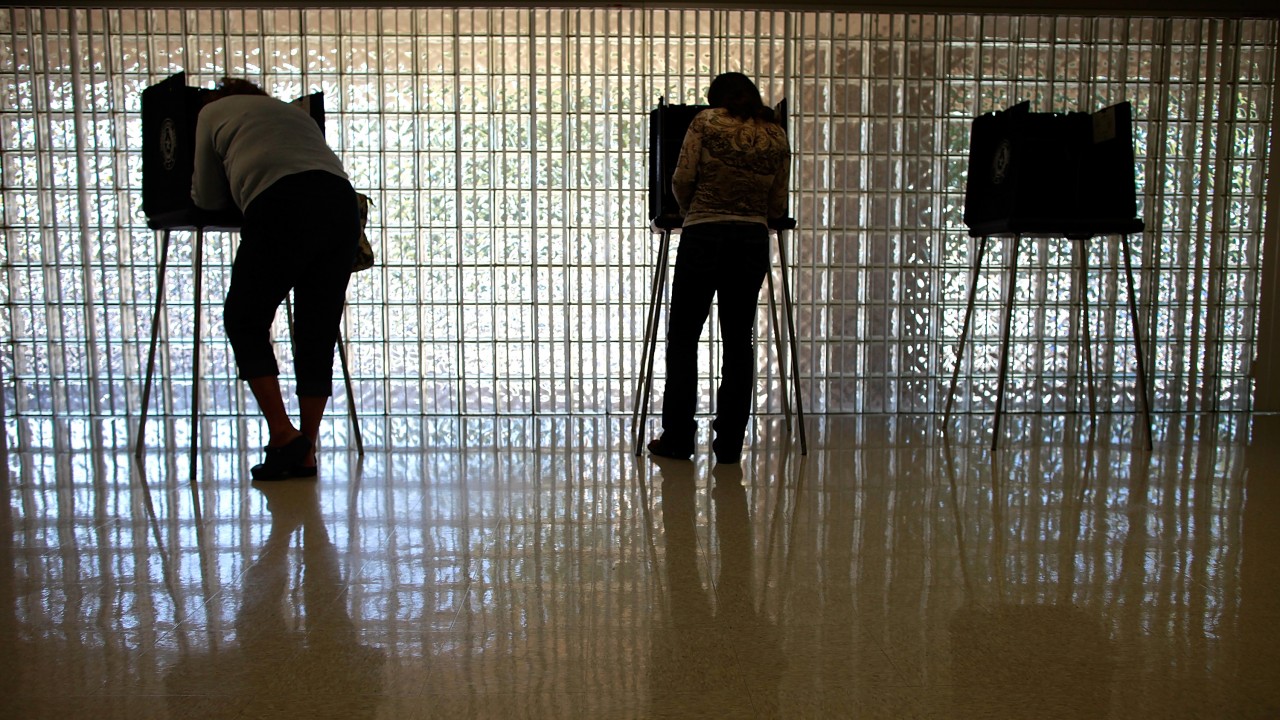
Voters cast their ballots on November 6, 2012 in Mansfield, Texas. (Photo by Tom Pennington/Getty Images)
This year marks the first presidential election since the Supreme Court struck down key sections of the Voting Rights Act, which first was passed in 1965 to protect minority voters in states with racist election laws.
Following the SCOTUS decision in 2013, states moved swiftly to enact new restrictions on who could vote. According to the National Conference of State Legislatures, during the 2016 election, the most widespread of these restrictions — voter ID laws — will be in force in 11 states.
As a result, Sari Horowitz reports for The Washington Post today that more than half a million Texas voters likely lack the right form of ID to vote on Super Tuesday. Texas is one of five Super Tuesday states — the others are Alabama, Georgia, Tennessee and Virginia — where voters might face barriers to voting as a result of voter ID laws.
On Tuesday, the new laws could have a bigger effect in the Democratic contests where “voters of color will be disproportionately affected by the new restrictions,” said Ari Berman, author of “Give Us The Ballot: The Modern Struggle for Voting Rights in America.”
Former secretary of state Hillary Clinton is counting on minority voters, particularly in the South, to support her as she tries to secure the Democratic nomination. On Tuesday, six of 11 Democratic contests will take place in Southern states with large populations of black voters. Clinton has been raising the issue of voting rights for months, and her campaign’s top lawyer has filed lawsuits against new voting restrictions in several states.
Meanwhile, the Justice Department is waging legal battles across the country to stem the tide of the new laws.
“This is the first presidential election in the more than 50 years of the Voting Rights Act that the department’s ability to enforce the act has been so severely cut back,” said Vanita Gupta, who heads the Justice Department’s civil rights division. “Until Congress acts to restore the full protection of the act, we are fully committed to doing all that we can to make sure every eligible citizen has equitable access to a meaningful vote.”
For more than a decade, US senator and presidential candidate Ted Cruz, who is banking on winning his home state of Texas, has been a major proponent of the state’s particularly restrictive voting laws. Spencer Woodman recently detailed for The New Republic how, back in 2006, Cruz, then the state’s solicitor general, vigorously backed an effort by Texas Attorney General (now Governor) Greg Abbott to prosecute Texans who were helping fellow citizens vote absentee — resulting in get-out-the-vote organizers “coming under criminal investigation for handling someone else’s ballot.” Woodman writes:
As the number of cases mounted, critics began to cry foul that the highly technical charges were mostly being deployed against black and Hispanic Democrats. In September 2006, the state Democratic party, and several subjects of Abbott’s actions, filed a civil rights suit against the state claiming that Abbott had launched a calculated attack on the access of minority populations to the polls. As evidence, the plaintiffs had discovered a PowerPoint presentation that Abbott’s office had used for training officials to enforce the voting laws. The presentation included imagery of African Americans going to vote; it also encouraged officers to place increased scrutiny on voting envelopes bearing stamps that raise awareness about sickle-cell anemia, a blood cell disease that particularly affects African Americans. The lawsuit alleged that the Attorney General’s office had questioned voters about this type of stamp in investigating two African-American plaintiffs.
More recently, in 2013, after the Supreme Court struck down laws requiring voters to present proof of citizenship, Cruz offered up legislation that would counteract the Supreme Court decision.
Ironically, Ted Cruz is hoping for a high voter turnout to beat rivals Donald Trump and Marco Rubio in tomorrow’s elections. But those half a million voters who might be barred from the polls? As poor and minority voters — likely Democrats — they’re unlikely to be casting ballots in his primary anyway.




